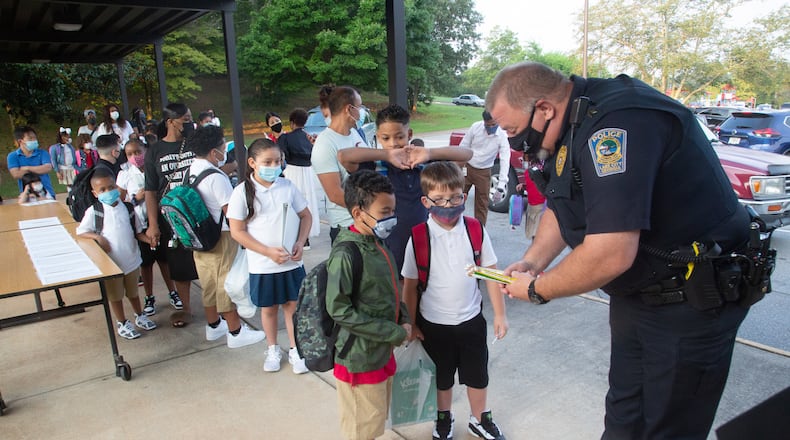New rules for Georgia schools went into effect this week allowing districts to make their own quarantine policies for students exposed to COVID-19.
The Aug. 2 order by Georgia Department of Public Health Commissioner Kathleen Toomey recommends that schools follow the recommendations of the Centers for Disease Control and Prevention but says “schools may elect to adhere to different quarantine requirements as developed by the local school district to facilitate in-person learning.”
Toomey’s order comes as metro Atlanta school districts reopen their doors amid a surge in coronavirus infections driven by the delta variant.
On Friday, Gwinnett and Cobb County school districts, the state’s first and second largest districts, reported hundreds of cases of COVID-19 in their first days of school this week.
The CDC recommends that unvaccinated students exposed to an infected person quarantine for 14 days — or as little as 7 days if they test negative for COVID-19. Fully vaccinated students need not quarantine unless they are showing symptoms of infection, the agency’s guidance says, but should wear a mask in school for 14 days or until they produce a negative test result.
Gov. Brian Kemp, during a visit with local leaders at Ball Ground Elementary School in Cherokee County Friday, said he fully supported Dr. Toomey’s order allowing schools to set their own quarantine measures.
Credit: Ty Tagami
Credit: Ty Tagami
The governor touted his hands-off approach with schools and said Friday that he is continuing with that policy.
“So even with the rise in cases that we have seen, I’m confident our schools can make decisions at the local level,” Kemp said.
Some districts have updated their policies based on the new order. More changes could come.
Cherokee and Forsyth counties are not requiring quarantines for students who come in contact with someone who tests positive for COVID-19. Cobb and Fulton counties are not requiring them either, but are requiring exposed students to temporarily wear a mask. (Fulton also implemented a mask mandate for most schools in its district this week. Atlanta and DeKalb County already had one). Atlanta is quarantining for 10 days though students can return after seven if they test negative. DeKalb County said it is following the guidance of the CDC and the local board of health.
Quarantines have been disruptive. Cherokee had to quarantine hundreds of students last year, temporarily shuttering some schools. More than 100 students at Atlanta’s Drew Charter School had to quarantine within the first week of classes last week after two students and two employees tested positive for COVID-19.
Throughout the pandemic, education leaders have had to balance the dangers of infection against the consequences of academic disruption and social isolation. Children have been less likely to suffer serious consequences from COVID-19 than adults, but over 60,000 of the more than 4.2 million children infected in the United States have been hospitalized and at least 350 have died, Dr. Lee Savio Beers, president of the American Academy of Pediatrics, said this week.
The group’s Georgia chapter sent a letter to all of Georgia’s school superintendents last month urging that students be allowed to attend school in person, with precautions, such as universal mask-wearing and quarantines.
Michelle Gunter said her son, now a junior in Cherokee County, was never diagnosed with COVID-19 but had to sit out 47 days of school last year because he happened to be near people who were. He returned from one quarantine only to be sent home for another three days later, she said.
Gunter was “ecstatic” about the new quarantine policies in Cherokee. “We appreciate them putting the kids’ education first,” she said.
Credit: Alyssa Pointer
Credit: Alyssa Pointer
On Wednesday, after Toomey’s order, Cobb County issued new rules that say asymptomatic students, including those who are not vaccinated, can attend school after exposure if they wear a mask for 10 days.
After a reported infection Tuesday at the elementary school attended by Zack Rippeon’s daughter, students identified as close contacts were sent home for 10 days, he said. But they returned to school Thursday after Cobb revised its rules.
The prior rule was untenable given the number of students it forced to stay home, Rippeon said, but the new rule is too complicated. Now teachers must keep track of which kids are supposed to be masked. The universal masking of last year was easier to enforce but it was unpopular, he said. To him, the new state guidance “is yet another example of people in leadership positions being unwilling to make hard decisions.”
About the Author
Keep Reading
The Latest
Featured





